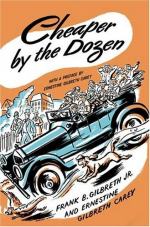
|
| Name: _________________________ | Period: ___________________ |
This test consists of 15 multiple choice questions and 5 short answer questions.
Multiple Choice Questions
1. Which of the following was true of Lillian Moller Gilbreth and Frank Bunker Gilbreth?
(a) Frank had a great sense of humor, while Lillian was always very serious.
(b) Before he met Lillian, Frank was a reserved and quiet man.
(c) They were quite different from each other, but very similar in their love for children.
(d) Frank didn't want as large a family as Lillian did, but he wanted to make her happy.
2. What was Dad's favorite part of their first car?
(a) The horn.
(b) The color of the paint.
(c) The spare tire.
(d) The steering wheel.
3. What was a reason Dad drove the children to advance quickly in school?
(a) He wanted to get as many of them as possible through college before he died.
(b) He didn't do well in school himself, and he wanted his children to do better than he did.
(c) He wanted them to compete in national academic competitions.
(d) He wanted to brag to everyone about how smart his children were.
4. What did the children do before they left the area where they ate lunch?
(a) They sang songs together.
(b) They played a practical joke on Dad.
(c) They took turns reciting things they had learned from Mother and Dad's lessons.
(d) They picked up all of the garbage, including the garbage left by other people.
5. How did Dad respond when Bill played a practical joke on him?
(a) He was mad at first, but then saw the humor in it.
(b) He punished Bill.
(c) He forbade anyone in the house from playing practical jokes ever again.
(d) He immediately laughed and was proud of his son's sense of humor.
6. The children joined together to vote for __________.
(a) A canoe.
(b) A cat.
(c) A tree house.
(d) A dog.
7. Which is an example of how Mother's approach to parenting tempered Dad's approach?
(a) Mother firmly discouraged Dad from entering Ernestine into a high level competition.
(b) Mother put her foot down when Dad would try to make the children more efficient.
(c) Mother didn't play practical jokes on the children.
(d) Mother allowed the children to break the rules sometimes so they could have fun.
8. What method did Dad use with the children to reinforce that they work hard in school?
(a) He made them meet with the principal once a week.
(b) He rewarded them heavily.
(c) He punished them often.
(d) He signed them up for classes below their grade level.
9. Why did Dad feel it was important to conduct a roll call before leaving on their family outing?
(a) On two occasions, some of the children were left behind.
(b) He always maintained a strict routine, even when it wasn't necessary.
(c) He had never left any of the children behind, but he wasn't going to risk it.
(d) He wanted to inspect their appearances and be sure they looked respectable.
10. When people questioned why the car was so crowded with children, how did Dad respond?
(a) He angrily told them to mind their own business.
(b) He said that if it would have been cheaper to purchase a dozen cars, then he would have done so.
(c) He cheerfully informed them that children come cheaper by the dozen.
(d) He jokingly said that the dozen children were for sale, and cheaper if they bought the car too.
11. What comment did one woman in particular make about the children?
(a) The poor children looked adorable in their uniforms.
(b) The children appeared to be very well-behaved.
(c) The children looked hungry.
(d) The children were probably greedy and undisciplined.
12. Throughout Chapter 6, what quality does Dad display with regard to his children?
(a) Passiveness about his children's education.
(b) Dedication to educating them whenever he could.
(c) Patience, allowing his children to play when they're young and be educated when they're older.
(d) Intolerance for their lack of interest in education.
13. Which of the following is true about Dad's background?
(a) His mother was a passive woman and died very young.
(b) His father had a construction business and encouraged his son to follow the same career path.
(c) His father was a store owner and died very young.
(d) He was an orphan, because both of his parents died when he was very young.
14. What was the family's code name for going to the bathroom in the woods instead of using a public restroom?
(a) "Visiting Mr. Meadow."
(b) "Visiting Mrs. Murphy."
(c) "Visiting Mr. Tree."
(d) "Visiting Mrs. Willow."
15. What did Frank Gilbreth, Sr. do when a child or group of children did something that pleased him?
(a) He gave them treats and rewards.
(b) He took them out to dinner.
(c) He told them elaborate, creative bedtime stories.
(d) He let them skip their chores for one day.
Short Answer Questions
1. What influence did Dad's work life have on his home life?
2. Why did Dad name their first car "Foolish Carriage"?
3. What method did Dad use to ensure no one forgot their hygiene or socialization?
4. How did Lillian Gilbreth often begin her platform appearances?
5. What did Dad tell his family he had purchased, when really he had purchased a car?
|
This section contains 979 words (approx. 4 pages at 300 words per page) |

|




